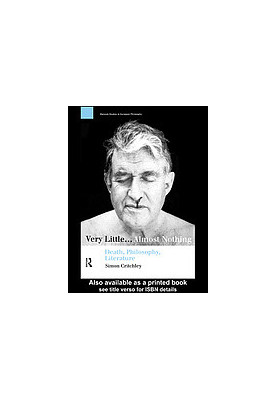Very little-- almost nothing : death, philosophy, literature
 Instant download
Instant download
after payment (24/7)
 Wide range of formats
Wide range of formats
(for all gadgets)
 Full book
Full book
(including for Apple and Android)
Let me say a few words about how I see philosophy. The book opens with the statement that philosophy begins in disappointment. That is to say, philosophy begins not, as ancient tradition relates, in an experience of wonder at the fact that things (nature, the world, the universe) are, but rather with an indeterminate but palpable sense that something desired has not been fulfilled, that a fantastic effort has failed. One feels that things are not, or at least not the way we expected or hoped they might be. Although there might well be precursors, I see this as a specifically modern conception of philosophy. To give it a name and date, one could say that it is a conception of philosophy that follows from Kant’s Copernican turn, namely that the great metaphysical dream of the soul moving frictionlessly towards knowledge of itself, things-in-themselves and God is just that, a dream. Absolute knowledge of things as they are is decisively beyond the ken of fallible, finite creatures such as ourselves. An insistent theme of Very Little… Almost Nothing, which also resounds through much of my other work, is that human beings are exceedingly limited creatures, a mere vapour or virus can destroy us. As Pascal said, we are the weakest reed in nature and this fact requires an acknowledgement that is very reluctantly given. Our culture is endlessly beset with Promethean myths of the overcoming of the human condition, whether through the fantasy of artificial intelligence or contemporary delusions about cloning and genetic manipulation. We seem to have enormous difficulty in accepting our limitedness, our finiteness, and this failure is a cause, in my view, of much tragedy.One could, and perhaps should, give an entire taxonomy of disappointment, and I am trying to think about epistemological disappointment in some work I am preparing. However, the two forms of disappointment that concern me most urgently are religious and political.
LF/727768/R
Data sheet
- Name of the Author
- Critchley
Simon - Language
- English
- Series
- Warwick Studies in European Philosophy
- ISBN
- 9780415128223
- Release date
- 1997






![[Eddy Stone 01] • Eddy...](https://lionbook.net/1289381-thickbox_default/-eddy-stone-01-eddy-stone-and-the-mean-genie-s-curse.jpg)


















